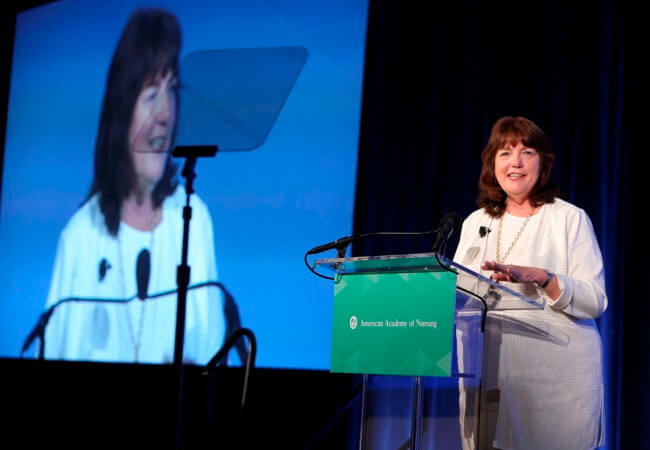
At AAN Conference, Reinhard Urges Support for Family Caregivers

Family caregivers provide $470 billion of free care every year. That’s a whopping number. $470 billion is roughly equal to the annual volume of sales at Walmart, the world’s largest company. And the figure surpasses the total dollars spent by Medicaid in any given year.
Susan Reinhard, PhD, RN, FAAN, senior vice president and director, AARP Public Policy Institute and chief strategist, Center to Champion Nursing in America, shared these startling statistics with many of the 1,000 attendees who congregated in Washington, D.C., Thursday for the American Academy of Nursing’s annual policy conference.
Reinhard’s keynote address kicked off a three-day exploration of “Transforming Health, Driving Policy.” In her remarks, Reinhard explained that 60 percent of family caregivers are doing medical nursing tasks such as wound care or administering intravenous fluids, despite receiving little instruction or support.
“Family caregivers are desperate for help,” she said. “They’re worried about making mistakes, and they don’t know what questions to ask.”
Reinhard first became aware of the problem as a young visiting nurse, and studied the demands on caregivers with Carol Levine, MA, and Sarah Samis, MPA. A report released last month by the National Academy of Medicine confirms their findings.
Throughout her remarks, Reinhard emphasized the urgency of supporting this hidden workforce. AARP has backed The CARE Act, legislation that requires hospitals to instruct designated caregivers who will be helping patients with the transition to home. Reinhard said the law has made “a profound difference” in the 33 states and territories that have passed it.
Reinhard was joined on the stage by Margaret Flinter, PhD, APRN, BC-FNP, FAANP, FAAN, senior vice president and clinical director of the Community Health Center, Inc., a federally qualified health center in Connecticut. She made the business case for transformation of care in the community. Flinter described various trends that are shaping primary care delivery—from the use of nurses to manage chronic conditions to the use of telehealth to increase access to specialty care—and shared promising developments in her home state related to payment reform.
In looking ahead to the changes that will come with the Medicare Access and CHIP Reauthorization Act (MACRA) in 2017, she warned care providers that they could do “a little” or “a lot” in response to the new regulations, but they “can’t not be on this train of improving and transforming care without suffering a financial penalty.”
Flinter is optimistic about the direction care transformation is headed. “For the first time,” she concluded, “our incentives are all aligned—for the patients, the providers and the payers.”
Photo courtesy of the American Academy of Nursing.
